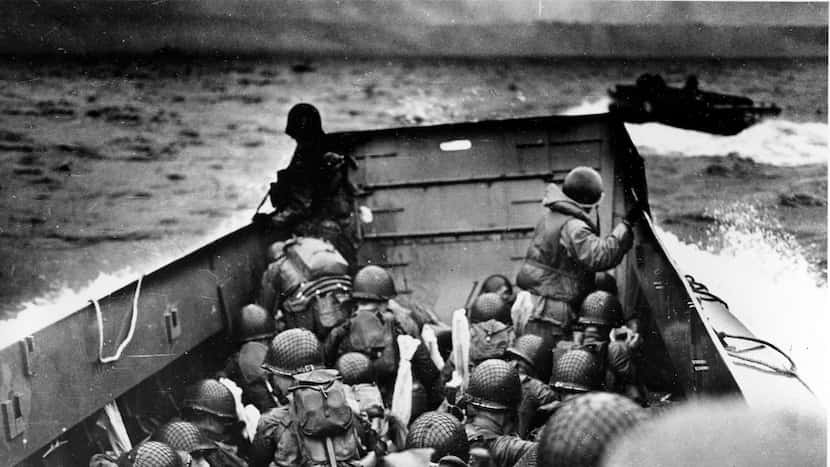In 1944, young people from every corner of America answered the nation's call. From Minnesota to Missouri, New York to California, they sailed for Europe and began the long and difficult struggle to liberate the continent from Nazi tyranny.
On May 31st, they set off again to Dallas.
Following a 1940s-themed farewell ceremony, attended by General Dwight D. Eisenhower's granddaughter Mary Eisenhower, about 60 World War II veterans will depart for France to commemorate the 80th anniversary of the Normandy landings.
Their stories should inspire gratitude and awe in all Americans.
Also in attendance will be the ever-smiling Henry Langler, 99. Just hours before the beach landings, Langler parachuted deep behind enemy lines and famously crashed through the glass roof of a French greenhouse. After weeks of fierce fighting, he was wounded and taken prisoner, but managed a daring escape just before the end of the conflict.
Also traveling will be Jim Kunkle, 101, of California. A former Army Air Corps pilot, Kunkle flew his first combat mission over Normandy and dozens more over Germany. On September 16, 1944, he was shot down near Aachen, the first German city to fall to the Allied forces. He suffered a broken spine and severe burns.
The passengers were Ralph Goldsticker from Missouri, John Connelly from New Jersey, and Lester Schrenk from Minnesota. Goldsticker, 102, flew two crucial sorties during the Normandy landings, attacking German coastal defenses. Connelly, 99, and Schrenk, 100, faced the darkest months of their lives after their aircraft was shot down and they were taken prisoner of war. Schrenk, a turret gunner, bailed out over enemy territory in February 1944, and Connelly, a flight gunner, bailed out in July 1944.
Conditions in the camps were horrific, with the men facing endless beatings and poverty. Imprisoned for more than 15 months, Schrenk remembers the day the men in the camp defiantly sang “God Bless America.” In 2012, he unexpectedly befriended the German pilot who shot down his plane.
Joachim Calisto, 97, of Pennsylvania, and Raymond Glasberg, 102, of New York, both arrived in Europe at the end of the war and shared the harrowing mission of liberating concentration camps.
Two of the participants, Max Gurney (102) and Frank Cohn (98), were born in Germany but fought for the Allies. Gurney, who moved to the United States as a teenager, enlisted after the attack on Pearl Harbor. The Army quickly noticed his linguistic skills – he spoke six languages - and soon he was in North Africa, interrogating German prisoners of war. By the summer of 1944 he was in Italy gathering intelligence vital to the liberation of Rome. Cohn's Jewish family fled to New York as the Nazis rose to power. He gathered intelligence in postwar Germany, some of which enabled the prosecution of high-ranking Nazi officials for war crimes.
Accompanying me on the journey is Robert Scheep, 99, of California, who fought for 42 days in the Battle of the Ruhr, a brutal conflict that allowed the Allies to seize Germany's most important military-producing region. The battle helped end the European war, and Scheep was soon put on a cargo ship bound for the Pacific. When victory over Japan was declared, he had already been at sea for 72 days.
Vernon Mitchell, 103, of Fort Worth, is preparing to return to an emotional coastline. He landed on the beaches of Normandy as a gunner with the 2nd Infantry Division. Just days later, his unit was ordered to clear the Cerisy Forest. As American forces advanced, the Germans opened up a heavy artillery barrage. Mitchell was wounded, and two of his best friends were killed in the same shell explosion. He returned to duty in time for the Battle of the Bulge.
“We fought through it and we got through it,” he says, understating the war.
That's just a few of the heroes who will be aboard our American Airlines charter flight — not to mention our world-class medical staff, six Medal of Honor recipients from other conflicts, and active-duty cadets from every military academy in the United States. Seat by seat, row by row, this plane will be a gathering of our nation's past, present and future.
First Army, an organization I am proud to be a part of today, under the command of the great General Omar Bradley, led all American ground and airborne forces on D-Day. We consider many of these heroes personal friends and have thought long and hard about what to say to them in France. “Thank you for your service” seems completely inadequate.
So, as they prepare for this historic journey, I will simply quote the promise General Bradley made to his soldiers before the invasion: “See you on the shore!”
Major General Ryan is the Acting Commander of the First Army, the historic force that led all ground and airborne forces in the Normandy landings.
We welcome your comments via letters to the editor. Please see our guidelines. Send your letter hereIf you have any problems with the form, please email us. Email:


